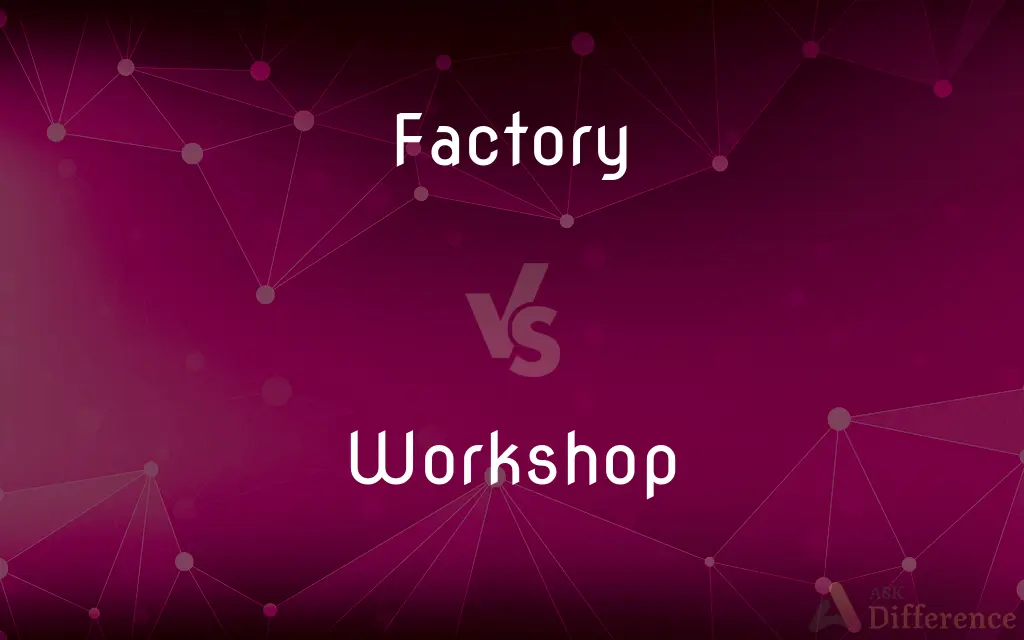Factory vs. Workshop — What's the Difference?
By Tayyaba Rehman & Urooj Arif — Updated on March 11, 2024
A factory is a large-scale industrial site for mass production, often using heavy machinery, whereas a workshop is a smaller space focused on handcrafted or specialized items.

Difference Between Factory and Workshop
Table of Contents
ADVERTISEMENT
Key Differences
Factories are large-scale operations focused on manufacturing products in high volume, often involving assembly lines and heavy machinery. They play a crucial role in mass production, emphasizing efficiency and output. Workshops, on the other hand, are smaller, more intimate spaces where skilled artisans or workers create, repair, or customize products, often by hand or with less automation. The emphasis in workshops is on craftsmanship, customization, and attention to detail.
While factories are typically associated with the industrial sector, producing goods on a massive scale for widespread distribution, workshops cater to more specialized markets or personal customer needs. This difference highlights the scale of production and the target market each serves. Factories often rely on standardized processes and materials to ensure consistency and meet high demand, whereas workshops may use a variety of materials and techniques to produce unique or custom items.
Factories require significant capital investment, large teams of workers, and extensive facilities to operate efficiently. They are designed to maximize product output and reduce per-unit cost through economies of scale. Workshops, in contrast, can be run with fewer resources, less space, and a smaller workforce, focusing on the quality and uniqueness of the products rather than volume.
The work environment in factories is highly structured, with specific tasks assigned to workers, often in a repetitive nature due to the assembly line production model. This environment is designed to optimize productivity and minimize production time. In workshops, the environment is more flexible, allowing for creativity and adaptability. Workers in workshops may have a broader range of skills and tasks, reflecting the custom nature of the work being produced.
In terms of employment, factories offer jobs to a large number of people, often requiring specific skills related to the operation of machinery or assembly processes. Workshops provide employment opportunities that are more varied, often requiring artisanal skills, creativity, and a detailed understanding of the craft or product being made.
ADVERTISEMENT
Comparison Chart
Scale
Large-scale production
Smaller-scale, more personalized
Focus
Mass production, efficiency
Craftsmanship, customization
Machinery
Heavy, automated
Less automation, more hand tools
Output
High volume
Lower volume, unique items
Work Environment
Structured, repetitive tasks
Flexible, creative
Compare with Definitions
Factory
A large industrial building where goods are manufactured in high volume, often using heavy machinery.
The factory produces thousands of cars each month.
Workshop
A room or building where goods are made or repaired by hand.
The artisan’s workshop is filled with unique pottery pieces.
Factory
Factories employ a large number of workers, often performing specialized tasks.
Factory workers operate machinery and monitor production quality.
Workshop
Often run by individuals or small teams with specialized skills.
The workshop employs skilled craftsmen to hand-make each item.
Factory
Structured and fast-paced, focusing on efficiency.
The factory floor is bustling with activity around the clock.
Workshop
Encourages creativity and attention to detail.
The workshop is a space where creativity flourishes in every corner.
Factory
Aimed at mass production of goods for distribution.
The factory specializes in mass-producing electronics.
Workshop
Workshops use a variety of hand tools and smaller machines.
Each tool in the workshop has its specific purpose for crafting.
Factory
Factories typically rely on automated machinery to maintain high production rates.
The assembly line in the factory is fully automated.
Workshop
Focuses on custom, handcrafted items.
The workshop produces custom-designed jewelry.
Factory
A factory, manufacturing plant or a production plant is an industrial site, often a complex consisting of several buildings filled with machinery, where workers manufacture items or operate machines which process each item into another. They are a critical part of modern economic production, with the majority of the world's goods being created or processed within factories.
Workshop
Beginning with the Industrial Revolution era, a workshop may be a room, rooms or building which provides both the area and tools (or machinery) that may be required for the manufacture or repair of manufactured goods. Workshops were the only places of production until the advent of industrialization and the development of larger factories.
Factory
A building or group of buildings in which goods are manufactured; a plant.
Workshop
A room, area, or small establishment where manual or light industrial work is done.
Factory
See factory ship.
Workshop
An educational seminar or series of meetings emphasizing interaction and exchange of information among a usually small number of participants
A creative writing workshop.
Factory
A business establishment for commercial agents or factors in a foreign country.
Workshop
To create or revise (a drama or literary work) based on suggestions or criticism from a group of collaborators.
Factory
The source of prolific production
A rock group that was a hit-tune factory.
A motel that served as an illegal drug factory.
Workshop
A room, especially one which is not particularly large, used for manufacturing or other light industrial work.
Factory
The position or state of being a factor.
Workshop
A brief, intensive course of education for a small group, emphasizing interaction and practical problem solving.
Factory
A trading establishment, especially set up by merchants working in a foreign country.
Workshop
An academic conference.
Factory
A building or other place where manufacturing takes place.
History has shown that, even without cheap labor, factories run perfectly well.
Workshop
(transitive) To help a playwright revise a draft of (a play) by rehearsing it with actors and critiquing the results.
Factory
A police station.
Workshop
(transitive) To work on or revise something, especially collaboratively, in a workshop.
Factory
A device or process that produces or manufactures something.
Workshop
To improve through collaboration.
Factory
A factory farm.
Chicken factory; pig factory
Workshop
A shop where any manufacture or handiwork is carried on.
Factory
(programming) In a computer program or library, a function, method, etc. which creates an object.
Workshop
Small workplace where handcrafts or manufacturing are done
Factory
Having come from the factory in the state it is currently in; original, stock.
See how there's another layer of metal there? That's not factory.
Workshop
A brief intensive course for a small group; emphasizes problem solving
Factory
A house or place where factors, or commercial agents, reside, to transact business for their employers.
Factory
The body of factors in any place; as, a chaplain to a British factory.
Factory
A building, or collection of buildings, appropriated to the manufacture of goods; the place where workmen are employed in fabricating goods, wares, or utensils; a manufactory; as, a cotton factory.
Factory
A plant consisting of buildings with facilities for manufacturing
Common Curiosities
Do factories employ skilled artisans?
Factories primarily employ workers to operate machinery and follow specific production processes, which may not require artisanal skills.
What is the main difference between a factory and a workshop?
The main difference lies in scale and focus: factories are for mass production, emphasizing efficiency, while workshops are smaller, focusing on craftsmanship and customization.
Can workshops produce goods at the scale of factories?
Generally, no. Workshops are designed for smaller-scale production, focusing on quality and customization rather than mass production.
Can a workshop be part of a factory?
Yes, some factories may include specialized workshops for custom work or repairs within their larger operation.
Do factories or workshops offer better employment opportunities?
It depends on the individual's skills and interests. Factories may offer more jobs, but workshops can provide fulfilling work for those with artisanal or specialized skills.
How do production methods differ between factories and workshops?
Factories use assembly lines and standardized processes, while workshops may employ a variety of techniques tailored to creating unique or custom items.
What kind of products are typically made in workshops?
Workshops typically produce handcrafted or custom items, such as furniture, jewelry, or specialized machinery.
How does the working environment in a factory compare to that in a workshop?
Factories have a structured, repetitive work environment focusing on efficiency, while workshops offer a more flexible, creative atmosphere.
Are workshops more expensive to operate than factories?
On a per-item basis, the cost of producing goods in workshops can be higher due to the focus on customization and craftsmanship.
How do automation levels differ between factories and workshops?
Factories rely heavily on automation for efficiency, whereas workshops use less automation, focusing on manual skills and craftsmanship.
How do factories and workshops impact the environment differently?
Factories can have a significant environmental impact due to their scale of operations and resource use, whereas workshops typically have a smaller footprint.
Can workshops use automated machinery?
Yes, workshops can use automated machinery for specific tasks, but they generally maintain a focus on handcrafted work.
Is it easier to start a workshop or a factory?
Starting a workshop requires less capital and fewer resources than a factory, making it more accessible for small businesses or individuals.
Are products from workshops considered more valuable than those from factories?
Products from workshops can be considered more valuable in terms of craftsmanship and uniqueness, appealing to niche markets or customers looking for custom items.
Can workshops compete with factories in terms of production speed?
Workshops cannot match the production speed of factories due to their focus on craftsmanship and customization.
Share Your Discovery

Previous Comparison
Arrangement vs. Preparation
Next Comparison
Potter vs. CeramicistAuthor Spotlight
Written by
Tayyaba RehmanTayyaba Rehman is a distinguished writer, currently serving as a primary contributor to askdifference.com. As a researcher in semantics and etymology, Tayyaba's passion for the complexity of languages and their distinctions has found a perfect home on the platform. Tayyaba delves into the intricacies of language, distinguishing between commonly confused words and phrases, thereby providing clarity for readers worldwide.
Co-written by
Urooj ArifUrooj is a skilled content writer at Ask Difference, known for her exceptional ability to simplify complex topics into engaging and informative content. With a passion for research and a flair for clear, concise writing, she consistently delivers articles that resonate with our diverse audience.
















































